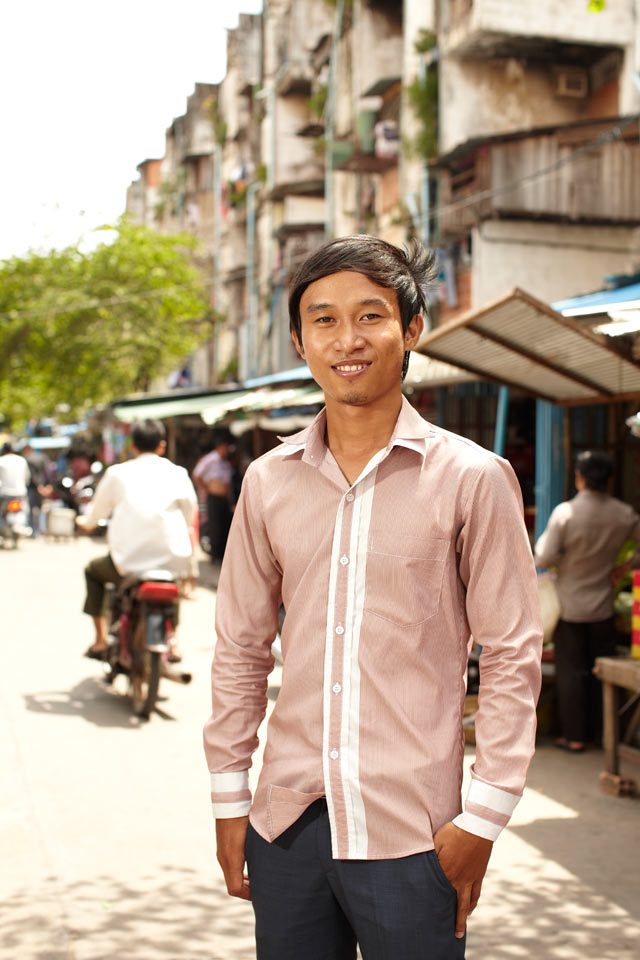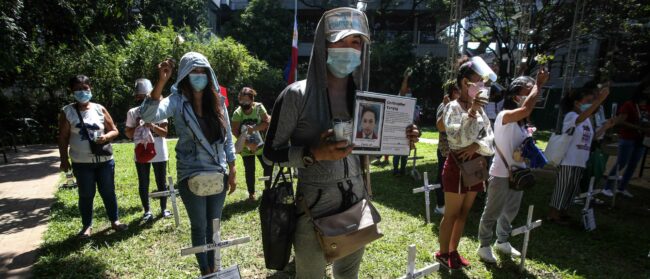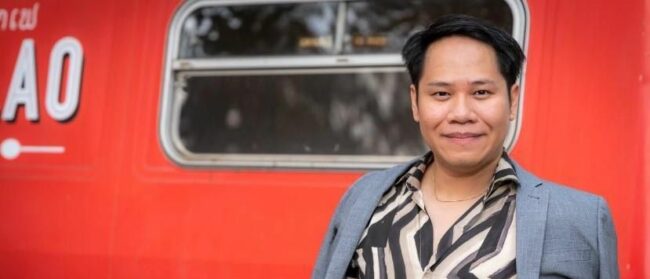Resources to feed and educate a child, access to shelter and a life free of abuse are fundamental rights, yet each day millions of Cambodians struggle to meet their basic needs alone.
With more than 30% of the population living below the national poverty line of just over 60 cents a day, gaps between rich and poor, and those in urban and rural areas, continue to grow despite efforts to address widespread inequality and poverty by NGOs.
Maggie Eno, coordinator of M’Lop Tapang, an organisation supporting street children in Sihanoukville, says her work highlights the harsh reality of the lives of Cambodia’s women and children, the groups most at risk of human rights abuses.
“Without social work support, poor people and people with troubled lives have no way to take control and solve their problems,” she says. “People need to feel supported and cared about, instead of isolated and discriminated against, but they also have so few good quality services to access.”
Social workers have been pivotal to rebuilding marginalised segments of Cambodian society. However, for all their expertise, there has been a missing link in the sector, staffed largely by social work professionals and volunteers from abroad.
Locals have added value to the work of foreigners through NGO training programmes that develop social work concepts. However, it was not until June 2012, when the first cohort of university social work students completed their graduate level studies with the Royal University of Phnom Penh (RUPP), that the Kingdom’s social work sector took a pivotal forward step in providing long-term solutions for community development in the country.
“Expats are great for training, supervising and offering support for the Khmer social work team, as well as helping [in] difficult cases,” Eno says. “But Cambodians have a deeper understanding of the setting, problems, culture, belief system and of course the language.”
Tracy Harachi, an associate professor from the University of Washington and partnership director of RUPP’s social work department, says that despite a significant amount of foreign advocacy in the country, numerous social problems remain unaddressed. “Too often programmes have not been evaluated and questions have not been asked as to why better outcomes have not been achieved,” she says.
The course structure not only aims to build skills in areas of community empowerment and human capacity, it also includes scientific methods to evaluate practices, key concepts and techniques of budgeting and financial management, as well as legal studies in both a local context and an international framework.
“Social workers must operate across society from the micro, meso- and macro levels, so it is important [that] students gain an understanding and perspective of how social work intersects within these institutional structures,” Harachi says.
In 2008 the bachelor degree programme, which had been in the pipeline for nearly ten years, was approved by the Ministry of Education and a group of Cambodia’s brightest students were admitted to study under a government awarded scholarship.
Dalin Meng, head of RUPP’s social work department, says the 22 professionally educated Khmer graduates will create a new path towards social stability. “We have had so much rebuilding to do. Sometimes it seems overwhelming,” she says. “We have relied a lot on foreigners over the past two decades. It is now important to build capacity among Cambodians to address our own problems.”
While the success of the degree programme will no doubt add value to the field, graduating students will enter a sector dominated by local and international NGOs, largely existing under the influence and with the financial support of international donors, which have contributed more than $700m to the areas of health, gender rights and community and social welfare in Cambodia since 1991.
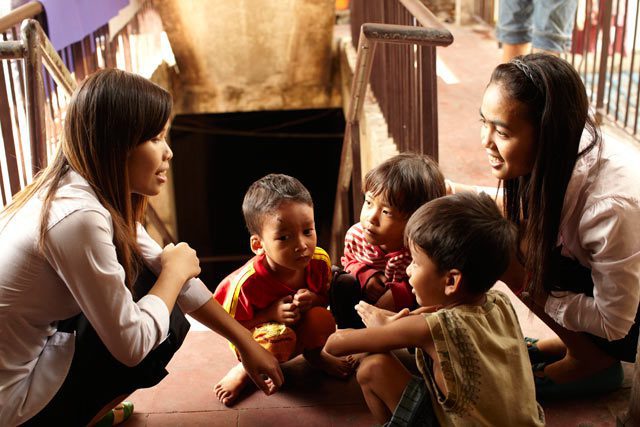
“Donor countries and NGOs have made strides in filling gaps in poverty reduction programmes, most of which directly address the needs of the very poor, the disadvantaged and vulnerable groups in Cambodia,” Puchong Senanuch, a social policy expert and scholar of social work at Huachiew Chalermprakiet University in Thailand says. “However, the government should be showing more concern on social protection of the people, especially the most marginalised groups.”
Despite Cambodia’s steady increase in GDP per capita, government expenditure for social sectors has remained relatively low, with few government resources dedicated to building sustainable growth through the enhancement of human capacity.
As of the end of 2011, the Asian Development Bank has contributed a total of nearly $1 billion in loans to Cambodia, of which $40m has been allocated to health and social protection sectors – a marginal sum compared to funds earmarked for the transport and information and communication technology sectors, which totals more than $370m.
Without the help of vigorous international fundraising the university initiative would not have been possible. It is estimated $65,000 is needed to fund the department in 2013, which includes assistance for students unable to support their living expenses.
“In a country where only a few hundred college-educated individuals survived [the Khmer Rouge regime], it is incredulous to me that the donor community did not initially focus direct efforts on educating the next generation,” Harachi says. “How can Cambodia compete in the global economy, address social development, and/or improve governance when it lacks knowledge and capacity?”
With nearly 90 students enrolled in the RUPP degree to date, the department of social work is making amends for past oversights, producing locally educated professionals who will provide a level of cultural awareness and foundations for trust unparalleled by foreigners working in the social work field. It is a small step forward for a country in the infancy of rebuilding a sustainable society, but Meng says the advancement is heading in the right direction.
“Each year there will be more professionally-trained social workers to take leadership in helping to address the many social issues in my country,” she says. “It is these graduates who will bring lasting change to Cambodian communities.”
In their words:
Prak Chantrea
“At first I did not like my social work degree, but gradually I discovered many things about it that made me joyful and hopeful. I majored in social work because I got a scholarship, but originally I wanted to study mathematics. I did not know what social work was about, but it was new, so I tried it. I now love social work to a degree I never thought was possible. It has changed the way I think, my behaviour and my attitude to work; I am more self-aware and self-reflective. Before studying with RUPP, I thought of myself as a young, hopeless and low-ability person who would not be able to work and help people. Once I knew what social work was and I reflected on Cambodia’s situation, I understood why this field of work is needed in Cambodia – to help vulnerable people get equal opportunities in society by respecting human rights and social justice.”
Lart Souy
“When I lived in the countryside, I saw domestic violence, poverty, illiteracy, mental illnesses, gender inequality and human rights violations almost every day. These problems were not solved quickly, and this is why I thought I should help people.
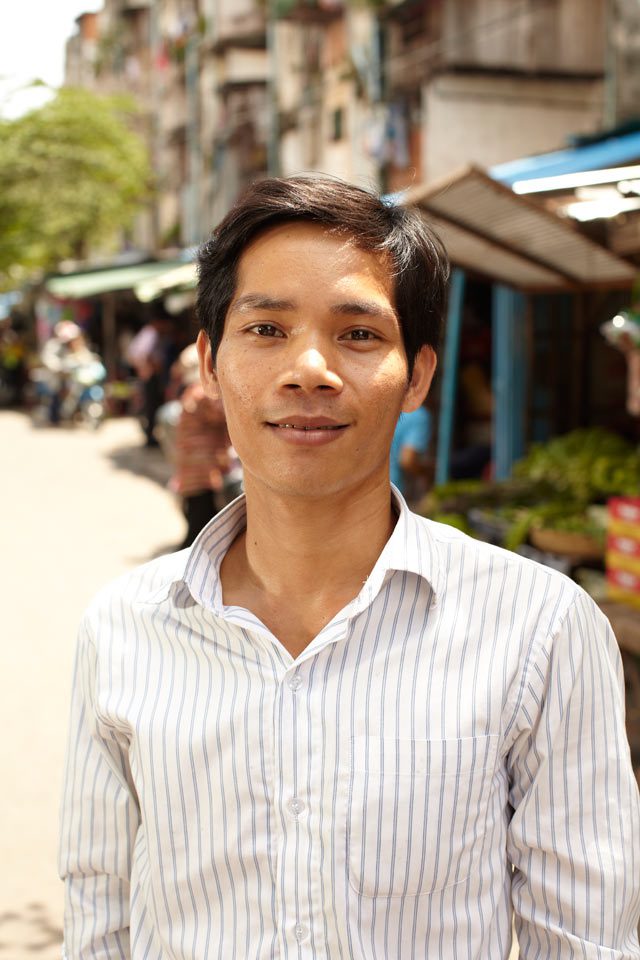
My decision to study social work was not the wrong choice; it was absolutely right because social work is a subject focused on empowering and strengthening vulnerable people, promoting social changes and providing students with critical thinking.
It was not easy to learn and reflect on the many fundamental social work concepts since I had no experience in working with vulnerable people during the first two years. I tried to imagine again and again whether my reflections were logical or not.
After taking many courses on social work and learning skills in the subject, I have gained both personal and professional development. My self-esteem, self-confidence, self-awareness and self-motivation have all improved. Similarly in my professional development, I can work with different kinds of people using good communication skills and compassion.
With my current job, I hope to improve my understanding of community empowerment practice toward sustainable development. My long-term vision is to work for either the government or an NGO. In particular, I like working with vulnerable women and children – I want them all to have access to basic needs and equal rights.”

